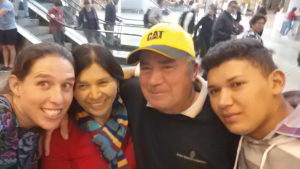
“It’s the right thing to do,” Kelly Chauvin, Immigration Services Coordinator at CWS repeated time and again regarding her work with the Central American Minors program (CAM). Simply being the right thing to do, however, does not make it easy. Founded in 2014, in response to the 2013 crisis at the Southern US border, the CAM program seeks to reunite children who have been separated from their families. To qualify, these children must be unmarried minors from either Honduras, Guatemala, or El Salvador.
The crisis began in 2013 when huge numbers of unaccompanied children risked their lives to cross the desert to reunite with family members who were legally present in the United States. In 2014, for instance, over 68,000 unaccompanied children were apprehended by border police trying to cross illegally into the United States. What happened to those children? Kelly explains that due to “a broken immigration system, there was no legal vehicle in place to bring those kids to the United States.” The Obama administration responded to this crisis with the CAM program, which allows children to petition to enter the US legally with refugee or parolee status. Parents with legal status in the United States can also file a petition on behalf of their child. This, however, is simply the beginning of a long, grueling process.
The children go through immense levels of security clearance screening, which involve health reviews and a number of interviews with officers from both the International Organization for Migration (IOM) and the United States Citizenship and Immigration Services (USCIS). A number of children go through these interviews alone, from which there are three possible outcomes: refugee status, parolee status, or no status at all. In order to receive refugee status, a child must be able to articulate clearly both the reason for their persecution with the act of being persecuted. For example, if a child belongs to a Christian youth group that is actively anti-gang, the child must be able to clearly articulate that he or she is being persecuted by a gang on the basis of his or her being Christian. If a child is not able to clearly connect these, then they could receive parolee status. Prior to 2017, about thirty percent of those admitted were given refugee status. The other seventy percent received parolee status. Receiving no status at all was uncommon, as ninety-six percent of children were granted a status to come to the United States. With such high admittance rates, Kelly points out, “persecution was very evident, these children were in great danger.”
But in 2017, the Trump administration abruptly stopped the CAM program without providing any explanations for their decision. Not long after this, the Trump administration greatly reduced the number of refugees approved and removed the potential for parolee status. One was either granted refugee status or no status. Thus, the children that were originally granted parolee status but had not yet traveled to the United States were subsequently stripped of their status. What this meant for the children, Kelly says, is that, “someone told these kids that they could live with their parents and then took it back – told them that they couldn’t.”
In response to this decision, CWS and a couple other resettlement agencies came together and sued the Trump administration over the lack of an announcement and the revocation of parolee status. The lawsuit resulted in a partial win – those children who had had their parolee status revoked subsequently had it reinstated. Yet, five years later, those awarded parolee status in 2016 are still arriving in the United States. “Kids have been waiting five years to see their parents because of bureaucracy,” Kelly says. “Think of all those moments missed.”
The abrupt halt in the CAM program by the Trump administration was deeply traumatizing for many of those parents who were holding on to hope that their families will be reunited. Many of these parents came to the United States as far back as the 1990’s under Temporary Protected Status (TPS) and have been patiently waiting for the United States to make a pathway for them to bring their children here.
The Biden administration has reopened the CAM program, beginning by reopening those cases that were closed during the Trump administration. But now families seeking reunification are facing a new challenge. Many of the parents that are applying on their children’s behalf only have temporary protected status (TPS), such as a work visa. The Trump administration revoked TPS, which has not been reinstated by the Biden administration. So, if a child is here through the CAM program but the breadwinner of their family has had their status revoked and is under threat to be deported to an area they’ve worked hard to escape, the fear of being separated again is very real.
These individuals are not statistics, they’re not strangers. CWS works daily to ensure that we recognize that, in Kelly’s words, “these people are our neighbors. They belong to our churches. They work in health care, construction, and countless other industries. In fact, most of them speak English fluently.”
CWS is the hub for the CAM program in North Carolina. By government mandate, the CAM program is free, but only resettlement agencies can perform these tasks. Moreover, there are only five of these agencies in the area. So, if CWS doesn’t do it, these children cannot reunite with their families.
“All Americans believe that life, liberty, and the pursuit of happiness are basic human rights,” Kelly states. These rights are the very things in jeopardy. Kelly continues, “people have a human right to family unity and they cannot have that and still be alive where they are.”
The Biden administration starting the CAM program back up demonstrates that such programs are policy initiatives and are therefore politically driven. So, as voting Americans, it is our job to use our vote to advocate for those with no voice in our country. They do the hard work in getting to the United States, but we can certainly make their lives easier. Kelly is quick to point out that “if people don’t have a legal avenue for protection, they will not just sit there and die. Rather, they will choose to live.” Helping these children reunite safely with their families, then, “is the right thing to do.”
Despite the endless bureaucracy, Kelly has hope that, with the current administration, we can begin to welcome more children from Central America and reunite families. Otherwise, we jeopardize the very rights that we as American individuals hold so dearly.

